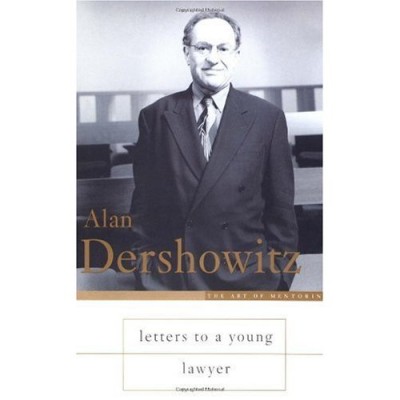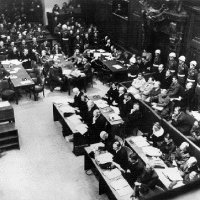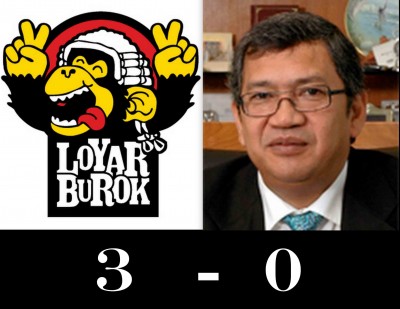Thoughts about the exercise of the Attorney General’s Chambers discretion to prosecute, its financial accountability, its lack of prudence, a quote from Dershowitz, Bangladeshis charged for sodomy and a brief description of a criminal trial.
 If my criminal career was adjudged solely from the few criminal legal aid cases I took from the Bar Council Legal Aid Centre (Kuala Lumpur), I could boast of an almost 90% success rate in defending my clients. The reason I don’t boast about this is because I know that my success is not entirely down to my ability; in fact, a large contributing factor to my success is actually the police and the Attorney General’s Chambers themselves. When you have such opponents, you need little assistance elsewhere. After a steady diet of legal aid criminal cases for more than a decade, I strongly feel that the Attorney General’s Chambers are generally incompetent in deciding the cases fit to be prosecuted, or for continued prosecution. The secret of my success is not because I am the next Amer Hamzah or Karpal Singh; it is not because I have a brilliant criminal mind (if not I’d be filthy rich by now); it is not because my cross-examination leaves the police witnesses trembling in tears begging to leave the box (although on occasion I do get the Judge to berate them harshly after successfully demonstrating how incompetent they were in discharging their duty).
If my criminal career was adjudged solely from the few criminal legal aid cases I took from the Bar Council Legal Aid Centre (Kuala Lumpur), I could boast of an almost 90% success rate in defending my clients. The reason I don’t boast about this is because I know that my success is not entirely down to my ability; in fact, a large contributing factor to my success is actually the police and the Attorney General’s Chambers themselves. When you have such opponents, you need little assistance elsewhere. After a steady diet of legal aid criminal cases for more than a decade, I strongly feel that the Attorney General’s Chambers are generally incompetent in deciding the cases fit to be prosecuted, or for continued prosecution. The secret of my success is not because I am the next Amer Hamzah or Karpal Singh; it is not because I have a brilliant criminal mind (if not I’d be filthy rich by now); it is not because my cross-examination leaves the police witnesses trembling in tears begging to leave the box (although on occasion I do get the Judge to berate them harshly after successfully demonstrating how incompetent they were in discharging their duty).
It is simple: I am assigned to clients charged for a crime they did not commit. Seriously. All I do in trials is demonstrate how my clients were not involved; of course, by tearing down the prosecution’s case. I just try my best to make sure the truth shines through the web of lies weaved by the police witnesses. Yes, it happens. A lot. The police will be lying about some aspect of the case – it could be about the entire event, or some crucial portions of the narrative linking the accused to the crime. Don’t believe me? Alan Dershowitz in his excellent book, Letters to a Young Lawyer, in the chapter titled, ‘An Honourable Profession?’ writes the following:
“… As a lawyer, you will see corruption all around you, unless you deliberately blind yourself to it. You will hear policemen lying through their teeth to convict people who they believe are guilty but whose constitutional rights they violated in order to secure the evidence of their guilt. You will see judges who know these policemen are lying, pretending to believe them in order to avoid freeing an obviously guilty defendant. You will read the opinions of the court of appeals judges pretending to believe the trial judges who pretended to believe the police who pretended to be telling the truth. This sort of ‘benign’ corruption is pervasive in our legal system – and everyone with any experience knows it. Yet we hear nothing about it on Law Day. We never see the slogan that should adorn every courthouse: “the end justifies the means.” Nor do we hear judges take the oath they really follows: “to do justice without respect to person” – unless those persons are drug dealers, Mafioso or represented by lawyers we don’t like.”

If this is true for the United States of America then it will be at least doubly true for Malaysia. In most of my legal aid cases, I find those charged were due to being at the wrong place, at the wrong time; whether it is being passed out in a drug dealers den, or stoned out on some stairs, or just somewhere in the vicinity, or a usual suspect. And those who are highly likely to end up in such situations are the poor, or without support from family or friends, or a marginalized member of society. They are often caught because they are convenient.
You may quite rightly ask why do the police catch people who did not commit the crime and recommend them for prosecution? I suspect this happens because the police consider a case solved if someone is arrested for it – not when a conviction is recorded against the accused. So long as the police arrest someone for the crime – their job is done – never mind whether they caught the right person or not. If the prosecution loses the case against an accused, the police will not be asked to re-open the case and re-investigate it. That will simply be the end of it. Remember the case of Norita Shamsudin – the accused, Hanif Basri, was acquitted – do you hear the police still trying to find the murderer for that case?
Furthermore, it is unclear what post-mortem analysis and action is taken about the crime committed after the prosecution loses the case. Is the officer who recommended prosecution of the crime reviewed or asked to explain why they lost? Is the Attorney General’s Chambers remotely aware of the expense, including opportunity costs, in prosecuting a criminal case? Are they aware that each case lost is a wasted expense for the State?
My experience and a consideration of their methodology demands the answer no.

The method of prosecution does not reflect an appreciation of these issues. Before I tell you about a case that exemplifies this issue it is necessary to first briefly explain the trial process. If you read the newspapers, may notice the report stating how the prosecution lost at the prima facie stage or ‘at the end of the prosecution’s case’. You need to understand this so you can better appreciate just how the Attorney General’s Chambers are financially wasteful in how it goes about its duty.
A criminal trial has 2 stages. The first stage is known as the ‘prosecution’s case’. In a criminal trial the prosecution always begins first. They must prove you committed an offence before you are legally required to respond. At this stage, the prosecution will summon witnesses, both civil and law enforcement; produce documents or expert reports to prove you committed the offence. At this stage, the defence will cross-examine the prosecution’s witnesses and seek to damage their case. The defence does not have to prove anything. All it has to do is cast doubt on the evidence to get acquitted. This is done by way of cross-examination. So a criminal lawyer who is unable to cross-examine effectively is a useless one. Once the prosecutor leads all the evidence they think satisfactorily proves the accused committed the crime they will close their case. This is the ‘end of the prosecution’s case’, also known as the prima facie stage.
Prima facie roughly translates from Latin to mean ‘at first blush’. At this stage the court considers whether the prosecution’s evidence proves the offence the accused is charged with without considering the defence. If the court feels the prosecution failed to prove a charge, it will dismiss the charge at this stage. What the court is saying with a dismissal is that: ‘The prosecution has no case.’ So a case dismissed at the prima facie stage generally indicates the prosecution messed up either in deciding it was a proper case to be prosecuted (policy decision) or at the trial prosecution itself (operational decision). I use the word ‘messed up’ because once the Attorney General’s Chambers decides to prosecute a case they should at least win at the prima facie stage. Losing a case at the prima facie stage means that all that money, effort and time spent on that case was wasted because all it did was vindicate an accused.
If the court feels the charge proven, it will call for the defence. The accused has 3 choices at this stage. He can remain silent, or make an unsworn statement from the dock (the prosecution cannot cross-examine what he says), or elect to give evidence i.e. sworn statement. He can call witnesses and tender documents to prove otherwise. At the end of the defence, the court would consider the evidence from the prosecution and defence, and decide whether or not the accused is guilty of the offence.
Does the Attorney General’s Chambers have a cost indication for each case it prosecutes? I don’t know but I don’t think so. Let me illustrate this with some numbers. Say each criminal case prosecuted in the Sessions Court costs the Attorney General’s Chambers about RM 100,000.00. Where does the cost come from? Police have to investigate and file the relevant paper work. Time and effort are spent. Witnesses are interviewed, prepped, scheduled and come to court to give evidence. Both police and public witnesses are often called. Evidence has to be stored, secured and transported. Prosecutors have to spend time preparing the case. Their seniors have to vet and approve their work. Courts have to clear time and space to hear the case. There is fuel, electric, water, stationary and administrative costs. There are other costs of maintaining this entire system. I have not even factored in the opportunity cost of all the participants to that effort or the costs of the subsequent appeals. When the Attorney General’s Chambers lose a case at the prima facie stage, all that is wasted. Burned. Gone.
This is why the Attorney General’s Chambers must be careful and mindful before it decides to prosecute a case – they are spending precious taxpayer money. What is the criterion upon which Attorney General’s Chambers decides whether a crime is prosecuted? I don’t know. But whatever it is, I think it rubbish. On to the case I mentioned earlier.
This was a case that I conducted with my friends Amer Hamzah and Edmund Bon some time ago when we had more time to actually coordinate ourselves enough to defend a case. Amer was assigned to act for an accused on a charge of sodomy with 2 others. Since he knew Edmund and I were keen, he invited us to act for the other 2 cases and conduct the trial together. The charge against our clients, 3 Bangladeshi men who were already imprisoned for overstaying without a valid working permit, was sodomy against an Indonesian man imprisoned in the same cell as them for different offence.
According to our clients, the Indonesian man was a ‘jambu’, a Malay slang word for an effeminate looking homosexual male. He invited them to have sex with him. Being strictly heterosexual they declined. He got angry. Extracted revenge on them by accusing them of sodomizing him. As a result these 3 Bangladeshis who could have been deported were now forced to stay in prison longer than their term because they were now in remand over a bogus sodomy charge. Poor them!
Now on the first day of the trial, we got wind the complainant had been deported back to Indonesia. When the Deputy Public Prosecutor (DPP) tentatively confirmed this, we sought an adjournment to have him conclusively confirm this. We asked this because if the complainant was not in Malaysia to give evidence then the prosecution had no case. This is especially so when there were no witnesses to the sodomy. But even if there were, they might not be sufficient to prove the act of penetration.

When we raised this with the Sessions Court Judge, he shared this view and asked the DPP to conclusively confirm his instructions to prosecute. The DPP however said his instructions were to proceed even if he had to confirm this. He had the photographer for the crime scene and the arresting prison officer with him and was instructed to proceed. So proceed we did and completed them both.
At the next date, the DPP confirmed the complainant was deported and not in Malaysia. There were no plans to bring him back for the trial either. We naturally requested the DPP to consider withdrawing the charges. We raised this with the Judge who also advised the DPP to reconsider. An adjournment was given and a mention date fixed.
When we came back on the next mention date, the DPP informed the court his instructions were to continue with the trial. The Sessions Judge was very annoyed and asked the DPP to explain his instructions. He informed the court that his superiors were of the view that since the trial had already begun with the examination of two witnesses they had to continue until the conclusion. Even though we were annoyed as well, I would pity the DPP more. How painful and humiliating is it to try and prove a case you knew for certain was a stinker of a loser (or even a certain winner for that matter)?
All of us knew this was rubbish. The DPP could withdraw the case at any time but chose not to. In truth, it is not left to the discretion of the actual prosecuting officer. They have to refer it. The decision to revise or withdraw a charge can only be considered and decided by a handful of superior officers at the state and headquarters (Putrajaya) level.
I have no doubt the Judge knew the case to be a waste of time. He fixed hearing dates a few days later – even withdrawing one day of his leave – and told the DPP to make sure all his witnesses were present warning that he would not tolerate any adjournments to the case. On the day fixed for continued hearing we went through the motions. We wasted the next two days in trial. Despite this, we still gave it a good show. We wanted the silliness of it all it to be at least reflected in the official records. So a poor medical officer had a whole morning being grilled by Amer on the medical report. He could have been saving lives instead of turning up for a lost cause and being pretty much ‘sodomized’ by Amer on the stand. We all could have been doing something more meaningful. But there we were.
Whose fault is that?

At the end of the prosecution’s case, the Judge immediately directed oral submissions. He delivered his decision immediately after the DPP concluded his submissions. As soon as his bottom hit the chair, the Judge announced his decision to acquit and release our clients. As soon as they got out of the dock, they came and bowed at our feet to show their gratitude. Hilarious stuff. I regret forgetting his name. He had good temperament, was concerned about the situation and had initiative. What impressed us about him was that he canceled his leave to finish off the case. That demonstrated his concern at the injustice before him as well as our clients’ plight.
So despite some of my bitching there are some good and true men and women out there. My salutations and heart goes out to those Judges and judicial officers up and out there who still give a damn and try to do the right thing when the opportunity presents itself. It’s never easy, but it is often worthwhile.
There are many such appalling cases. This is just one of those that I did. I am certain if you speak to a seasoned criminal lawyer you will perhaps hear more (or even less!) of such stories. Next time you read a newspaper always note when the prosecution lost its case. And don’t be surprised if you come across them losing at the prima facie very often. These are some of the higher profile cases reported in the media where they lost at that stage that I can think of: Eric Chia, Dato’ Ramli Yusuff , Abdul Razak Baginda, Datuk Mirza Mohammad Taiyab, Resty Agpalo and Mohamad Najib Zulkifli, Karpal Singh, Tan Sri Kasitah Gaddam, former PKR members Capt (Rtd) Mohd Osman Mohd Jailu and Jamaluddin Mohd Radzi, former Perak Tengah district councillors Usaili Alias and Zul Hassan, and more recently, V Navindran.
Though I welcome the recent injection of professionalism in the Attorney General’s Chambers dealings with our profession, it should now turn to more substantive matters; it could for a start consider how to refine its prosecutions to be more considered, successful and cost effective. Even though I act for the defence, it is not out of choice. The prosecution is not farmed out to the private sector like it is in England. Though I naturally seek victory in whichever case I conduct, the taste of victory in criminal cases always leaves me bittersweet. It is a zero sum game all round. Win or lose, someone always loses.
Oh yah, and by the way:

Fahri Azzat discussed this in a more summarized form a while ago in a case involving a founding Loyarburokker where the prosecution lost at the prima facie stage. Every attachment student, pupil and lawyer employed by his firm is expected to read the Dershowitz’s book, amongst others.

are you x-prosecutor yourself??
Dear Fahri, please help my brother as well as those who are genuinely innocent out there. It is pretty sad to know and difficult to accept the fact that: "You can only prove that you are not guilty, but you cann't prove that "they" are at fault."
Where has the justice gone?
Not surprising that the AGC is famed for blatant lies and incompetency. More so (as it manifest to become an indulgence to many as laughing stocks) since its logo portrayed its missions to appear in black mask, protrude two long Pinocchio noses, eyes wide shut, a pair of hearing impaired ears and speaks with five mouths with five versions of cross examinations…….while mimicking a Justice Bao’s signature mark on the forehead………..…. Just puzzled how and why our Hon judges, even the RCI ones like and applaud those despicable magical acts presented to them while sitting behind the watchful stare from the Supreme’s Portrait?
We need guys like Fahri to helm and revamp the whole dammed institution swiftly…. of cause right after the retarded regime CHANGED
@ Aerie – I believe that the other carrot other than money is respect. If the AG's Chambers was a place where the cream of the crop gravitate towards and to get a spot is difficult – that may well be an attraction in itself. But with the present AG this will prove very difficult.
@ Pang – Thanks for pointing that out! Oopsh!
@ Johnson – Laziness or apathy, it's hard to tell. What's clear is that there's little pride taken in both the actual work done and the manner in which it is done. But I am informed that it is not always the fault of the actual prosecuting DPP. Sometimes it is the seniors that have the more junior DPPs doing stupid cases or forcing them to proceed with it.
@ Abdullah – My apologies as I think I did not make myself clear. What I meant by an arrest is what you explained. I was operating on my own assumptions when I wrote that because for me an arrest would in most cases result in a charge against the accused. I equate them as the same thing. Shoddy prosecution is definitely the fault of the DPP but let us also be aware that sometimes the police witnesses can throw the case off too.
@ Beatnik – Absolutely.
The prosecution is a funny bunch. How many times have we heard instances where they chose not to charge certain people (of interest), or even when they do, they do it so shoddily. Sekadar melepaskan batuk di tangga. Almost always, an honest judge in a public interest case gets faulted/lynched by an angry public because of this, forgetting that judges can't possibly convict accused persons if the prosecution is fucking up their case.
Fahri
I thought in so far as the police is concerned, their case is closed when the Prosecutor charges, not when they arrest. So the fault for shoddy prosecution lies with the Prosecutor all the times.
TQ
Thanks for the insights into our criminal justice system. No wonder the police KPI achievements are allegedly higher but we don't feel any more secure.
Our Judicial system is in a mess. The police are more concerned in bring cases to court. Yes, just bringing them to court. Fairness is never in their mind.
If it is a poor soul he is beaten up, confession extracted and warned to plead guilty or he will be beaten up again. The charge is read out, sometimes just rattled away by the interpreter and the poor guy is replies "Salah".
If he is well connected, he is freed. Its always the poor who suffer.
Even without a shred of evidence the prosecutions wins the case.
This is called Malaysian Justice.
Oh sorry, how rude.
I meant to say, go and ask Yang Amat Terarif Tun Tan Sri Dato' Zaki Azmi.
Fahri, I am informed that Eric Chia's case was thrown out because of the brilliance of one of his Counsel. So I am told lah. lol!
I agree with you whole-heartedly. There must be a cost-benefit study on what the AG and his band of merry-men (and women – I heard some of them are really merry!) do. That is called financial accountability.
But than again, accountability is such a dirty word.
Don't believe me? Go and ask Zaki Azmi.
Dear Fahri, your article is spot on. Similarly I had conducted a legal aid matter previously whereby my client was charged together with 6 others because the police couldn't determine who was in possession of the drugs. Just before the start, the DPP suggested for either 1 out of the 6 to plead guilty,and for the remaining 5 others to share the fine….A case of being lazy? I don't know,but of course my client declined and we were ready at all times to claim trial.
"Win or lose, someone always loses."
Um, I think that makes it a negative sum game, not a zero sum game.
If I were you I would seek forgiveness from my mother and cheer her up by relinquishing my position to someone capable and live an honourable life.
To the AG of Malaysia. Do you have a face Mr. (You are not worth all the prefixes you may have before your name) Gani Patail? Don't you have some respect for your own dignity? You have been time and again proven to be inefficient of heading the Attorney General's Chamber. You are a waste of public money. Should you have some shame, you should resign with 'some honour' What would your mother think of you as an incapable person heading the AG Chamber and bring shame to her of your nefarious deeds?
You fucking cunt.how dare you accusing such an honorable person? he is there for a reason. he is a brilliant mind. you are a fucking disgrace!
Could it be because the civil service (including DPP's) pays so little? With poor incentive schemes in the public service, the drive to do your best is absent. Increment pun sikit. How can we get the best of lawyers to join the AG's Chambers if the paying scale is small?